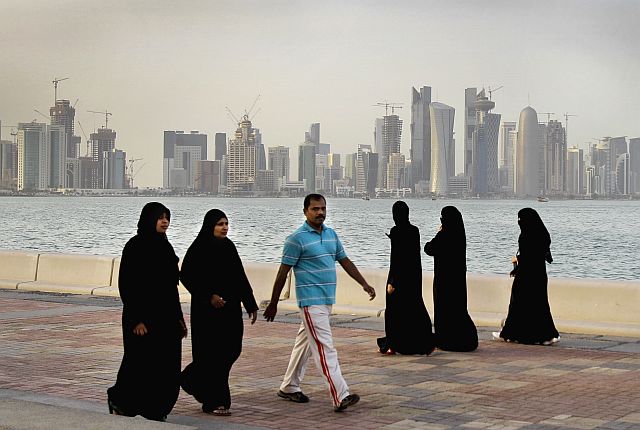
Qatari women and a man walk by the sea with the new high-rise buildings of downtown Doha in the background in this April 7, 2012 file photo. The economic slowdown gripping countries across the Persian Gulf can be seen in layoffs, slowed construction projects and government cutbacks. (AP)
Doha, Qatar — The economic slowdown gripping countries across the Persian Gulf can be seen in layoffs, slowed construction projects and government cutbacks. For the millions of foreign workers drawn by brighter job prospects, it can have a far-darker side if they find themselves deep in debt.
Gulf countries like Qatar largely don’t have bankruptcy laws, leaving laid-off workers on the hook for huge outstanding sums while often banned from traveling outside the country. That leaves many unemployed begging friends and family for help while frantically selling off all their belongings.
Others have killed themselves out of desperation.
“It was kind of scary for a while there,” said Robert Foster, an American from Beaufort, South Carolina, who found himself trapped for months in Qatar. “We sold everything we had.”
The Middle East has weathered several boom-and-bust cycles over the last decades, both buoyed and beaten by the global price of crude oil, as well as the recent recession. In 2009, the financial meltdown in Dubai saw dusty luxury cars parked and abandoned at its international airport and across the city as foreigners fled their debts.
This recent financial collapse began with oil prices falling from over $100 a barrel in the summer of 2014 to bottom out this January to under 30, a 12-year low. In the time since, oil has clawed back to $50 on supply disruptions and lowered reserves, but the damage already had been done in the Mideast.
Among those hard hit was Qatar, a small oil-and-gas-rich country on the Arabian Peninsula where construction accelerated with the announcement it would host the 2022 FIFA World Cup. As oil and gas prices sank, so too did Qatar’s coffers, leading to layoffs across both private and public companies.
The state-run Qatar Petroleum fired at least 1,500 foreign workers in recent restructuring, said Mohammed bin Saleh al-Sada, Qatar’s energy and industry minister.
“We did not start with the idea of laying off people for the sake of laying off people,” he recently told The Associated Press. “Nationals were not affected whatsoever, and that was part of our solid policy.”
Maersk Oil said in October it would cut as much as 12 percent of its staff in Qatar. Vodafone’s Qatar subsidiary announced on May 17 it would cut about 10 percent of its workforce, while mobile phone competitor Ooredoo also made layoffs this year. Al-Jazeera, the peninsula nation’s satellite news broadcaster, also shut down its American channel in April.
Foster, 50, a former senior operation manager for the state-linked Hamad Medical Corp.’s ambulance services, began working in March 2014 on a three-year contract, hoping to stay for at least six years to make enough to buy a house in the United States. However, he said he didn’t receive his first paycheck until three months into his job, which forced him to get a loan of 300,000 Qatari riyals ($82,000) to cover his living expenses, debts and child support payments in the US.
Disclaimer: The comments uploaded on this site do not necessarily represent or reflect the views of management and owner of Cebudailynews. We reserve the right to exclude comments that we deem to be inconsistent with our editorial standards.
